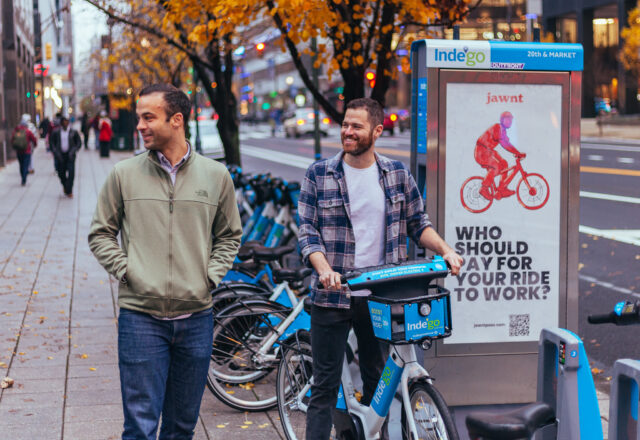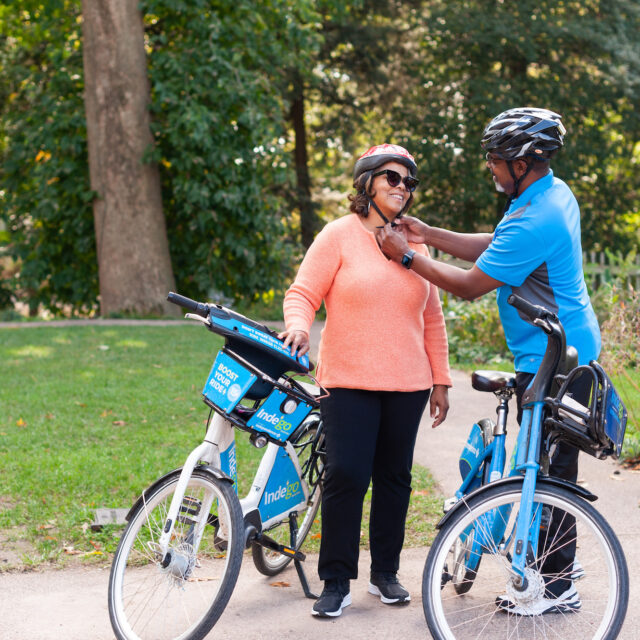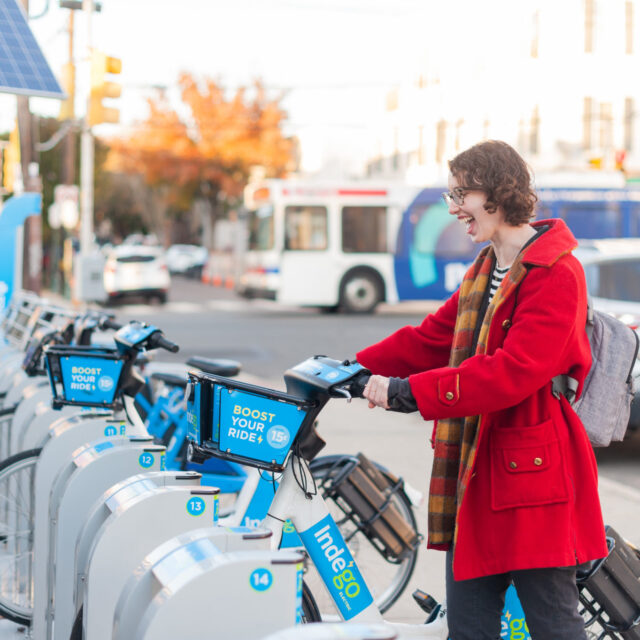Work-Provided Bike Share Is a Game-Changer
by Kiran Herbert, Communications Manager
January 11, 2023
A new partnership between Philadelphia’s Indego and jawnt means some employees can now ride for free as part of their transit benefits package.

Will Sanderson and Jeff Stade, co-founders of jawnt, are passionate about getting employers to subsidize bike share rides.
There’s a strong business case for companies to get behind bicycling. Bike programs can create happier, healthier employees, helping to build retention and save money in the long run. What’s more, from a bike advocacy perspective, employers are in a unique position to instigate the culture shift to more cycling since they own so many of our waking hours, including time spent commuting. By taking small steps to accommodate and incentivize bicycling, companies can have a stake in increasing employee wellness, which will only add to their bottom lines.
From an employee’s perspective, one of the main ways companies can help increase bicycling is by subsidizing some (or all) of the cost. Bike Share is a great, low-cost option for employers to consider, especially those located in urban centers where docks are abundant.
Bicycle Transit Systems, the team behind bike share systems across the country, including Philadelphia’s Indego, always saw the potential in tapping employers to get more folks using bike share. Without a dedicated sales team, however, the task of working with companies to coordinate benefits, communicate with employees, and solicit new players can be a lot for a marketing team to take on. Finding and partnering with jawnt, which operates a transit benefits platform for employers in Philadelphia, felt like a breakthrough.
“The jawnt team has been able to adopt and oversee the direct business-to-business sales, outreach, and administration that were beyond the current capacity of my team,” says Estevan Fernandez, marketing manager at Bicycle Transit Systems. “With the jawnt team able to lead personalized conversations with organizations, my team can focus on providing the marketing to drive the program overall.”
The Indego x jawnt partnership is relatively straightforward. Companies that were already using the jawnt platform to offer employees unified transit benefits can now offer Indego passes as well. Employers can elect to provide Indego at no cost to their employees, subsidize a portion, or pass on bulk savings. Employees then have unlimited access to Indego’s fleet of bikes.
Bicycle Transit Systems had been approached by other benefits platforms in the past but only jawnt jived with its desire to create a more equitable transportation space. Both companies understand that not everyone has the financial means to pay for personal transit and a benefits program that incorporates bike share offers people more options, from using bike share as a first- and last-mile solution to having a healthier mode of transportation. In order to ensure its offerings are inclusive, jawnt has different entry points for companies and a variety of pricing formats, allowing employees to spread costs across paychecks for example.
“We’re trying to make the whole process easy and accessible for everyone,” says Jeff Stade, co-founder and CEO of jawnt. “Our programs aren’t isolated to organizations that have at least 1,000 or even 100 employees, and that’s important to us. We knew there were smaller, independently owned businesses that needed this.”
There are currently a wide variety of companies using jawnt. It’s not just corporate offices but also franchises and restaurant groups — the sorts of places where people really need to be in person. Each company tends to do their benefits differently and amongst jawnt’s customers, there’s definitely a mix, with some fully subsidizing the cost of bike share (and other transportation options, like transit) and others covering a percentage.
“Programs that are fully subsidized can result in an 85% use rate from employees,” says Stade, noting that what a company chooses to do varies according to factors like industry and location. “With return to office initiatives and employees having other options for working remotely or hybrid, it’s becoming more and more popular for employers to be able to offer better benefits — and it’s being super well-received by employees.”
A higher use percentage is also better for bike share, meaning a system will see more rides, which translates to a greater number of people bicycling in a given city. According to jawnt co-founder Will Sanderson, these sorts of programs also resonate with bike advocates and they’re the ones that can help galvanize people in any given organization. Even for people who own their own bikes, a free or subsidized membership can help them ride even more, growing buy-in for bike share.
“There’s lots of interest from people on the HR and benefits side too,” says Sanderson, adding that a comprehensive benefits package that includes bike share can be a great tool for recruitment and retention. “Plus, for any company with a focus on ESG [Environmental, Social, and Corporate Governance], sustainability, or equity, it’s a meaningful differentiator.”
As jawnt grows, Sanderson and Stade hope to speak with other bike share systems that want to get memberships in the hands of more employees. Once introduced, programs like these sell themselves: Traveling by bike can bring joy to one’s daily commute, a part of life most people simply tolerate. Partnerships, however, remain key to getting commuter benefits programs off the ground and ensuring they stick.
“Transportation, historically, is not a lucrative business and it was important to us that this partnership [with jawnt] was not transactional,” says Fernandez. “As we see it, jawnt is part of the Indego family.”
Being part of the family means being willing to have hard conversations about the challenges facing bike share as an industry, remaining transparent and open to change. It also means a willingness to engage in the work … or in the conversations around barriers to bike share that currently exist, such as the need for safe infrastructure, the lack of engagement amongst historically underserved populations, and the fact that bike share benefits aren’t yet tax-free (like transit) at the Federal level.
“Not holding your cards close to your heart is what makes any partnership successful,” says Fernandez, adding that the jawnt team understands that. “This was never about driving revenue — we want to reach audiences we couldn’t before that have the greatest need.”
In addition to working with Indego and Bicycle Transit Systems, jawnt partnered with the Southeastern Pennsylvania Transportation Authority (SEPTA) and hopes to do the same with others as the company expands nationally. The jawnt team’s larger mission is to make transit the best way to move around and as they see it, bike share is an integral part of transit.
“There’s a lot of room for improvement in transit benefits,” says Stade, noting that historically employers let people take money from their paycheck and put it tax-free onto a debit card, which puts the onus on employees and often excludes new modalities. “We’re taking a different approach and our goal is to give riders access to every bus, subway, bike, and scooter.”
The Better Bike Share Partnership is funded by The JPB Foundation as a collaboration between the City of Philadelphia, the National Association of City Transportation Officials (NACTO) and the PeopleForBikes Foundation to build equitable and replicable bike share systems. Follow us on Facebook, Twitter and Instagram or sign up for our weekly newsletter. Got a question or a story idea? Email kiran@peopleforbikes.org.



